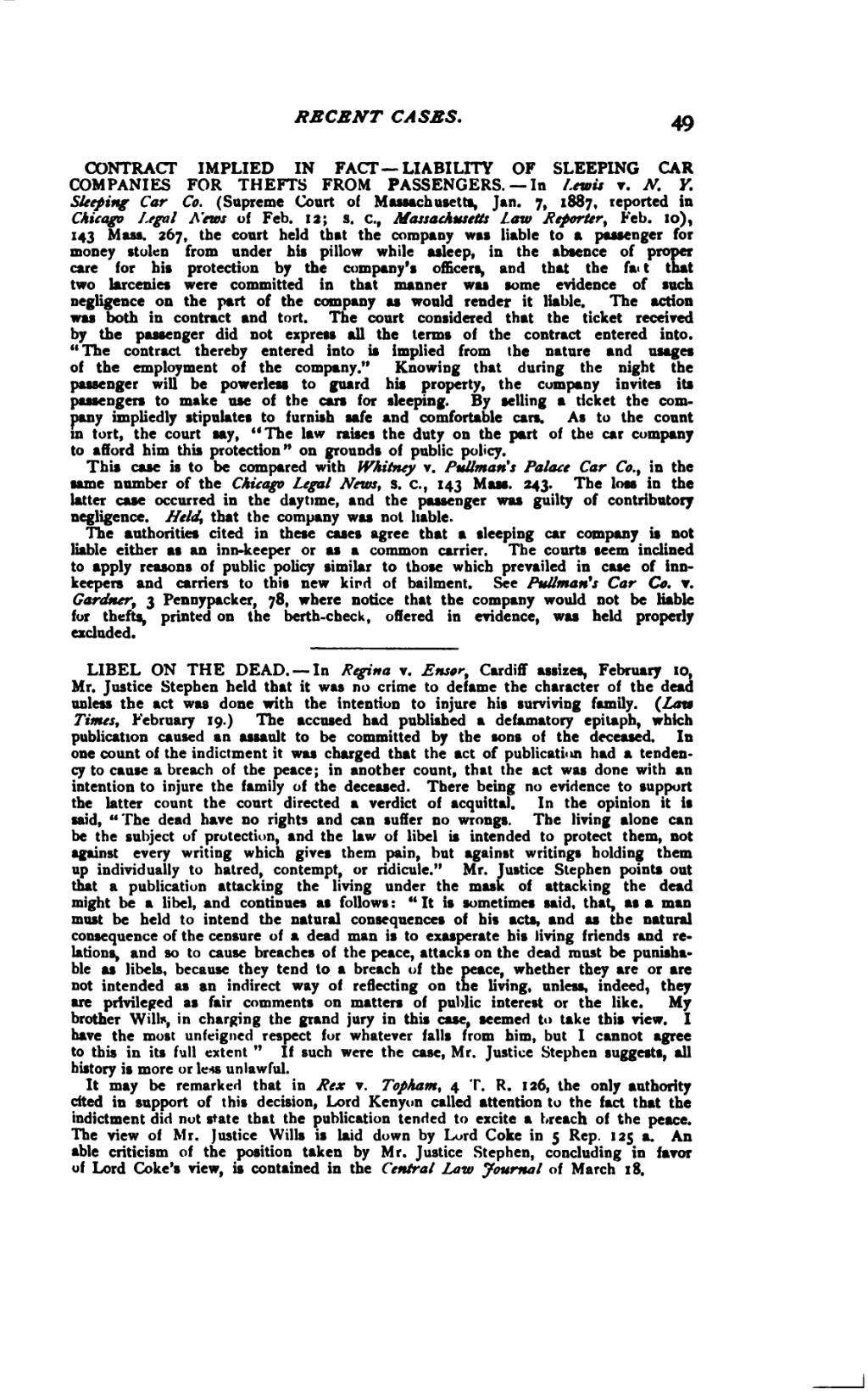CONTRACT IMPLIED IN FACT—LIABILITY OF SLEEPING CAR COMPANIES FOR THEFTS FROM PASSENGERS.—In Lewis v. N. Y. Sleeping Car Co. (Supreme Court of Massachusetts, Jan. 7, 1887, reported in Chicago Legal News of Feb. 12; s. c., Massachusetts Law Reporter, Feb. 10), 143 Mass. 267, the court held that the company was liable to a passenger for money stolen from under his pillow while asleep, in the absence of proper care for his protection by the company’s officers, and that the fact that two larcenies were committed in that manner was some evidence of such negligence on the part of the company as would render it liable. The action was both in contract and tort. The court considered that the ticket received by the passenger did not express all the terms of the contract entered into. “The contract thereby entered into is implied from the nature and usages of the employment of the company.” Knowing that during the night the passenger will be powerless to guard his property, the company invites its passengers to make use of the cars for sleeping. By selling a ticket the company impliedly stipulates to furnish safe and comfortable cars. As to the count in tort, the court say, “The law raises the duty on the part of the car company to afford him this protection” on grounds of public policy.
This case is to be compared with Whitney v. Pullman’s Palace Car Co., in the same number of the Chicago Legal News, s. c., 143 Mass. 243. The loss in the latter case occurred in the daytime, and the passenger was guilty of contributory negligence. Held, that the company was not liable.
The authorities cited in these cases agree that a sleeping car company is not liable either as an inn-keeper or as a common carrier. The courts seem inclined to apply reasons of public policy similar to those which prevailed in case of inn-keepers and carriers to this new kind of bailment. See Pullman’s Car Co. v. Gardner, 3 Pennypacker, 78, where notice that the company would not be liable for thefts, printed on the berth-check, offered in evidence, was held properly excluded.
LIBEL ON THE DEAD.—In Regina v. Ensor, Cardiff assizes, February 10, Mr. Justice Stephen held that it was no crime to defame the character of the dead unless the act was done with the intention to injure his surviving family. (Law Times, February 19.) The accused had published a defamatory epitaph, which publication caused an assault to be committed by the sons of the deceased. In one count of the indictment it was charged that the act of publication had a tendency to cause a breach of the peace; in another count, that the act was done with an intention to injure the family of the deceased. There being no evidence to support the latter count the court directed a verdict of acquittal. In the opinion it is said, “The dead have no rights and can suffer no wrongs. The living alone can be the subject of protection, and the law of libel is intended to protect them, not against every writing which gives them pain, but against writings holding them up individually to hatred, contempt, or ridicule.” Mr. Justice Stephen points out that a publication attacking the living under the mask of attacking the dead might be a libel, and continues as follows: “It is sometimes said, that, as a man must be held to intend the natural consequences of his acts, and as the natural consequence of the censure of a dead man is to exasperate his living friends and relations, and so to cause breaches of the peace, attacks on the dead must be punishable as libels, because they tend to a breach of the peace, whether they are or are not intended as an indirect way of reflecting on the living, unless, indeed, they are privileged as fair comments on matters of public interest or the like. My brother Wills, in charging the grand jury in this case, seemed to take this view. I have the most unfeigned respect for whatever falls from him, but I cannot agree to this in its full extent.” If such were the case, Mr. Justice Stephen suggests, all history is more or less unlawful.
It may be remarked that in Rex v. Topham, 4 T. R. 126, the only authority cited in support of this decision, Lord Kenyon called attention to the fact that the indictment did not state that the publication tended to excite a breach of the peace. The view of Mr. Justice Wills is laid down by Lord Coke in 5 Rep. 125 a. An able criticism of the position taken by Mr. Justice Stephen, concluding in favor of Lord Coke’s view, is contained in the Central Law Journal of March 18.

